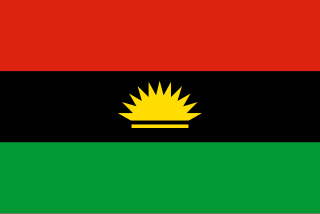
Biafra, officially the Republic of Biafra, was a partially recognised state in West Africa that declared independence from Nigeria and existed from 1967 until 1970. Its territory consisted of the former Eastern Region of Nigeria, predominantly inhabited by the Igbo ethnic group. Biafra was established on 30 May 1967 by Igbo military officer and Eastern Region governor C. Odumegwu Ojukwu under his presidency, following a series of ethnic tensions and military coups after Nigerian independence in 1960 that culminated in the 1966 anti-Igbo pogrom. The Nigerian military proceeded to attempt to reclaim the territory of Biafra, resulting in the start of the Nigerian Civil War. Biafra was formally recognised by Gabon, Haiti, Ivory Coast, Tanzania, and Zambia while receiving de facto recognition and covert military support from France, Portugal, Israel, South Africa and Rhodesia. After nearly three years of war, during which around two million Biafran civilians died, President Ojukwu fled to Ivory Coast in exile as the Nigerian military was approaching the capital of Biafra. Philip Effiong became the second president of Biafra, and he oversaw the surrender of Biafran forces to Nigeria.

Chinua Achebe was a Nigerian novelist, poet, and critic who is regarded as a central figure of modern African literature. His first novel and magnum opus, Things Fall Apart (1958), occupies a pivotal place in African literature and remains the most widely studied, translated, and read African novel. Along with Things Fall Apart, his No Longer at Ease (1960) and Arrow of God (1964) complete the "African Trilogy". Later novels include A Man of the People (1966) and Anthills of the Savannah (1987). In the West, Achebe is often referred to as the "father of African literature", although he vigorously rejected the characterization.

The Nigerian Civil War, also known as the Biafran War, was a civil war fought between Nigeria and the Republic of Biafra, a secessionist state which had declared its independence from Nigeria in 1967. Nigeria was led by General Yakubu Gowon, and Biafra by Lieutenant Colonel Chukwuemeka "Emeka" Odumegwu Ojukwu. Biafra represented the nationalist aspirations of the Igbo ethnic group, whose leadership felt they could no longer coexist with the federal government dominated by the interests of the Muslim Hausa-Fulanis of Northern Nigeria. The conflict resulted from political, economic, ethnic, cultural and religious tensions which preceded the United Kingdom's formal decolonisation of Nigeria from 1960 to 1963. Immediate causes of the war in 1966 included a military coup, a counter-coup, and anti-Igbo pogroms in Northern Nigeria.

Florence Nwanzuruahu Nkiru Nwapa, was a Nigerian author who has been called the mother of modern African Literature. She was the forerunner to a generation of African women writers, and the first African woman novelist to be published in the English language in Britain. She achieved international recognition with her first novel Efuru, published in 1966 by Heinemann Educational Books. While never considering herself a feminist, she was best known for recreating life and traditions from an Igbo woman's viewpoint.
Ada Udechukwu is a Nigerian artist and poet associated with the Nsukka group.
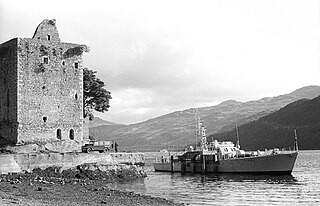
The Ford-class seaward defence boats were built for the Royal Navy in the 1950s.
Civil Peace is a 1971 short story by Chinua Achebe. It is about the effects of the Nigerian Civil War (1967–1970) on the people and the "civil peace" that followed.
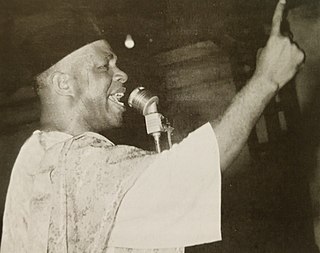
Kingsley Ozumba Mbadiwe (1915–1990) was a Nigerian nationalist, politician, statesman, and government minister in the Nigerian First Republic and a Biafran Roving ambassador during the civil war.

Okechukwu "Okey" Ndibe is a novelist, political columnist, and essayist of Igbo ethnicity. Ndibe was born in Yola, Nigeria. He is the author of Arrows of Rain and Foreign Gods, Inc., two critically acclaimed novels published in 2000 and 2014 respectively.

Half of a Yellow Sun is a novel by Nigerian author Chimamanda Ngozi Adichie. Published in 2006 by 4th Estate in London, the novel tells the story of the Biafran War through the perspective of the characters Olanna, Ugwu, and Richard.

Rolf Steiner is a German retired mercenary. He began his military career as a French Foreign Legion paratrooper and saw combat in Vietnam, Egypt, and Algeria. Steiner rose to the rank of lieutenant colonel commanding the 4th Commando Brigade in the Biafran Army during the Nigerian Civil War, and later fought with the Anyanya rebels in southern Sudan.

Dr Sebastian Okechukwu Mezu is a Nigerian writer, scholar, philanthropist, and publisher. He was involved in politics in Nigeria in the late 1970s.

The fall of Enugu was a military conflict between Nigerian and Biafran forces in September and October 1967 during the Nigerian Civil War which centered around Enugu, the capital of the secessionist Republic of Biafra. Nigerian federal forces had made Enugu's capture a priority shortly after war broke out, but their advance stalled at Nsukka. Biafran president and leader Odumegwu Ojukwu, attempted to distract the Nigerian Army by initiating an invasion of Nigeria's Mid-Western Region in August, but the offensive was brought to a halt. Lieutenant Colonel Theophilus Danjuma took charge of the Nigerian forces at the Nsukka front and prepared to advance on Enugu with seven battalions of the 1st Division. Enugu was garrisoned by one brigade led by Colonel Alexander Madiebo and poorly armed civilians called into service. Danjuma decided to launch an offensive with his forces spread over a broad front to make it more difficult for the Biafrans to block them along major roads as had happened up to that point.
Rosina Umelo is a Nigerian writer. She is known for her short stories, children's books and her young adult fiction. She also has published under the pen name Adaeze Madu.
Simi Bedford is a Nigerian novelist based in Britain. Her 1991 debut book Yoruba Girl Dancing, an autobiographical novel about a young Nigerian girl who is sent to England to receive a private school education, was well reviewed on publication and was the subject of a BBC Radio 4 abridgement. Her second novel, Not With Silver, was published in 2007.
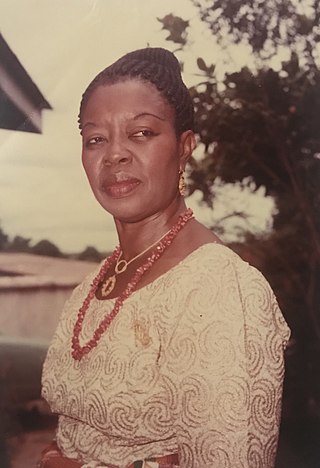
Teresa Ekwutosi Agbomma Meniru was a Nigerian writer of young adult literature and children's stories.
Charry Ada Onwu-Otuyelu is a Nigerian literature writer and the first female Director of Imo State Council for Arts and Culture. She is from Amaigbo in Imo State. She is a fiction writer of children's literature. She is an ex-soldier that worked with the Armed Forces medical service during the Biafran war. Her themes include folktales and history.

The Biafran Armed Forces (BAF) were the military of the Republic of Biafra, which existed from 1967 until 1970.
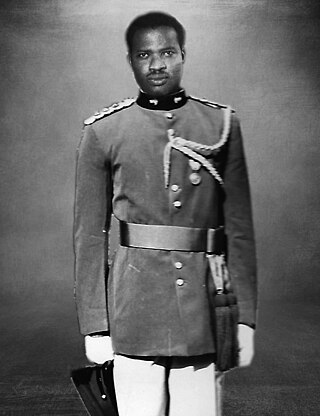
Ejike Ebenezer Obumneme Aghanya was a military officer and electrical engineer who served in the Nigerian Army and the Biafran Armed Forces, retiring as a colonel. Accused of involvement in the 1966 Nigerian coup d'état he was arrested and imprisoned without trial until the outbreak of the Nigerian Civil War where he served on the side of Biafra, holding key positions in the Biafran Armed Forces. He was the head of the Biafran Agency for Research and Production (RAP) which produced bombs, rockets, missiles, as well as ammunition, armored vehicles, telecommunication gadgets and petroleum refineries among others for the Biafran Armed Forces. Later he was the Chief of Staff of the Biafran Organisation of Freedom Fighters (BOFF) which was the guerrilla warfare and special operations arm of the Biafran Armed Forces. He also served as Battalion Commander, 44th Electrical and Mechanical Engineer Battalion Biafran Army and later Brigade Commander of the 58th Brigade of 12th Infantry Division Biafran Army during the war.

Destination Biafra is a 1982 novel by Nigerian writer Buchi Emecheta, first published in London by Allison & Busby. It is considered to be Emecheta's personal account of the Biafra War. Destination Biafra was republished in paperback on 1 March 1994 by Heinemann Educational Books as part of the African Writers Series.













